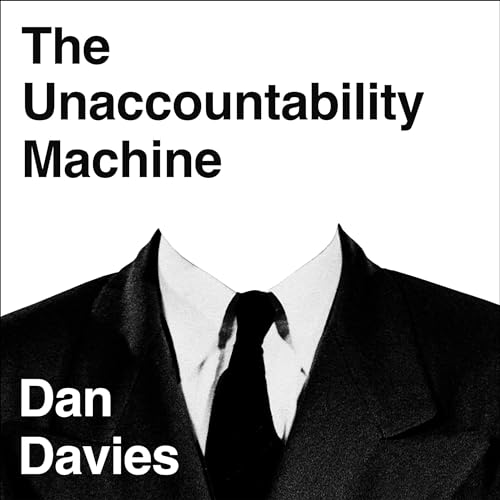The Unaccountability Machine: Difference between revisions
Amwelladmin (talk | contribs) No edit summary |
Amwelladmin (talk | contribs) No edit summary |
||
| (One intermediate revision by the same user not shown) | |||
| Line 1: | Line 1: | ||
{{a|book review|{{image|Unaccountability Machine|jpg|}}}}The epic judicial processes of 2024 have been Tom Hayes appeal against [[LIBOR rigging]], about which we have had much to say elsewhere, and the [[Post Office Horizon IT scandal]]. | {{a|book review|{{image|Unaccountability Machine|jpg|}}}}{{quote| | ||
’Tis neither malice, spite, nor virtue <br> | |||
Whose ledger swells, or plucks, the seedy fruits of progress —<br> | |||
But mainly accident.<br> | |||
Lest thee with surety know aught else —<br> | |||
Withhold thy assignations.<br> | |||
:—{{otto}}, {{dsh}} | |||
}} | |||
{{br|The Unaccountability Machine: Why Big Systems Make Terrible Decisions - and How The World Lost Its Mind}} — {{author|Dan Davies}}, 2024. | |||
The epic judicial processes of 2024 have been Tom Hayes appeal against [[LIBOR rigging]], about which we have had much to say elsewhere, and the [[Post Office Horizon IT scandal]]. | |||
Much of the engineering of corporate administration — you hardly need a doctorate in operations research to know there’s a lot of it — is there specifically to prevent [[bad apple]]s — or [[stupid apple]]s — subverting the system to ends for which it was not intended. | Much of the engineering of corporate administration — you hardly need a doctorate in operations research to know there’s a lot of it — is there specifically to prevent [[bad apple]]s — or [[stupid apple]]s — subverting the system to ends for which it was not intended. | ||
Revision as of 11:01, 1 May 2024
|
’Tis neither malice, spite, nor virtue
Whose ledger swells, or plucks, the seedy fruits of progress —
But mainly accident.
Lest thee with surety know aught else —
Withhold thy assignations.
The Unaccountability Machine: Why Big Systems Make Terrible Decisions - and How The World Lost Its Mind — Dan Davies, 2024.
The epic judicial processes of 2024 have been Tom Hayes appeal against LIBOR rigging, about which we have had much to say elsewhere, and the Post Office Horizon IT scandal.
Much of the engineering of corporate administration — you hardly need a doctorate in operations research to know there’s a lot of it — is there specifically to prevent bad apples — or stupid apples — subverting the system to ends for which it was not intended.
Much of the discourse about modern business administration is a catalogue of its singular failure to achieve that basic end. Our roll of honour at the disaster café refers.
LIBOR rigging and the sub-postmasters débâcle are pinnacle examples. With all that infrastructure, superstructure and supervision how were a band of relatively lowly trading staff able to run riot? Where were all the barking dogs?
With all its infrastructure, internal and external legal advice, consultancy, and, er, second sight, how did no-one stop to think something must be wildly, catastrophically, wrong with the Post Office’s theory of the situation? Just applying Otto’s razor?
Either we have localised problems — rogue gangs of bad apples — or the prevailing business administrative paradigm is in crisis and we need another theory of the game.
“Rogue gangs of bad apples” is always the preferred diagnosis because it relieves executives of primary accountability for the system and leaves them only with the plausibly deniable responsibility for hiring the rogues in the first place.
That the paradigm might be in crisis suggests we are paying too much for an administrative regime that takes credit for all the good stuff and slips through your fingers when things go tits up. Who in the C-Suite wants to believe that?
Tom Hayes and his buddies fit the “rogues gallery” identikit nicely. By microscopic adjustments that no-one else would notice, they stood to make multimillion pound bonuses for themselves. It was almost a victimless crime.
Susan Crichton, Rodric Williams, Jarnail Singh and Gareth Jenkins, and even pantomime villain Paula Vennells, less so. If they had anything to gain personally from systematically oppressing these pillars of the community nationwide, it was indirect, and paled in comparison to the city bonuses on offer to the LIBOR submitters.
And watching these individuals give evidence, two things occur: firstly, that things would not have to have been wildly different in the life stories of these witnesses and any of them might themselves have been sub-postmasters, on the other end of this outrage. None more so than Paula Vennells, an middle-English lay methodist.
Secondly — there but for the grace of God go I. Rodric Williams is a fifty-something expat New Zealander qqq
